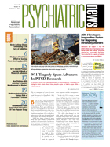September 11 was not a radical wake-up call for the Red Cross in its approach to the mental health consequences of disaster but probably accelerated some changes already under way, said Rob Yin, L.I.S.W., manager for disaster mental health at the American Red Cross headquarters in Washington, D.C.
"The majority of the people we serve will be resilient and won't need anything more than psychological first aid, but a minority will be at greater risk for more serious and long-lasting problems, so we want to find and support them," he said.
The Red Cross now has a network of 4,000 licensed mental health care providers of every professional category available to help in emergencies, he said. But they can't just walk in the door the day after.
Volunteers must first go through a screening and vetting process, then take a three-hour course orienting them to the Red Cross and its relief procedures. They learn the difference between working alone in an office and working with a team in the aftermath of a hurricane, tornado, or terrorist attack, said Yin. Among other things, volunteers find that their initial task may not be counseling disaster victims, but meeting their basic needs.
The organization will sometimes offer "just-in-time" training for new volunteers right after a big disaster, but prefers that they sign up in advance at a local chapter, he noted.
In 2005, the Red Cross also began training all its responders in postdisaster psychological first aid to help them recognize and refer for care anyone they encounter during disaster relief who seems to need more help.
That includes their own workers, said Yin. "We'll provide the best care for disaster victims if we provide care for our responders."
The Red Cross was criticized after Hurricane Katrina for how it dealt with people with mental illness, but Yin said it has learned from that experience.
"We did hear complaints that we did not appropriately accommodate everyone in every shelter," he said.
However, the Red Cross and other organizations have worked since to better accommodate people with "access and functional needs," including those with mental illness, he said.
The organization will continue to coordinate sheltering efforts with public-health and other agencies that can prescribe medication or other treatments that Red Cross volunteers cannot.
"In all our new trainings and guidance documents for shelter workers, health services volunteers, and mental health volunteers, we stress the need to provide support to everyone in the community, including those who may have a mental illness," Valerie Cole, Ph.D., a senior associate for disaster mental health at the Red Cross, told Psychiatric News.
A new mental health handbook, out later this year, will also educate shelter volunteers about mental illnesses and thus reduce their anxiety about working with such populations, she said.
